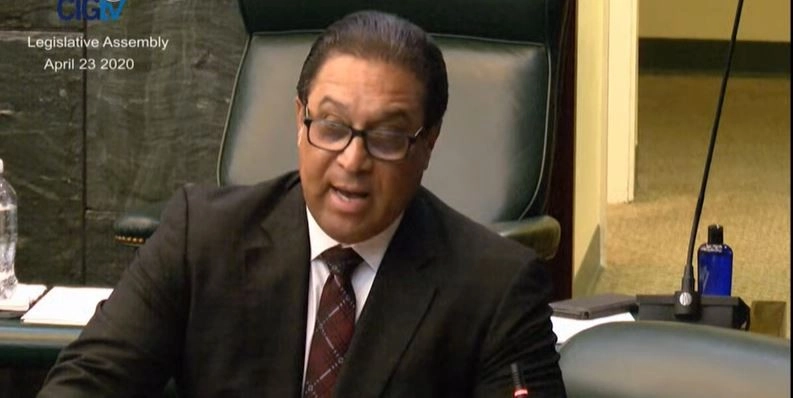MLAs Agree on Amendments to Immigration Law
MLAs Agree on Amendments to Immigration Law
The House assented to amendments brought by Government to the Immigration Law to provide for changed workforce needs brought about by the restrictions imposed in response to combatting COVID-19.
At the sitting in the LA (Thursday, 23 April 2020), Premier Hon. Alden McLaughlin, introducing the Immigration (Transition) (Amendment) Bill, 2020, noted the “very significant impact” that the shelter in place protocols have put on businesses and employees, with normalcy still some time away.
To ensure that unemployed Caymanians, who are the first priority, have first rights to job vacancies; all job vacancies have to be registered on the central clearinghouse for jobs – JobsCayman – for 14 days before employers can apply for a work permit.
If a Caymanian’s application is rejected, employers must give reasons and these reasons will be taken into account if they make a work permit application to fill the post.
The Premier noted that regulations are also being brought to introduce new rules for advertising overseas, to further protect Caymanians.
Additionally, changes to processes will allow work permit applications to be completed by email and processed electronically, as well as removing the requirement for some supporting documents with work permit renewals, such as a police clearance certificate and medical questionnaire.
Likewise, applications for permanent residence may be submitted electronically without any supporting documentation, which will be required to be provided at a later date.
The full text of the Premier’s statements to the House follows.
“Mr. Speaker, I beg to move the Second Reading of the Immigration (Transition) (Amendment) Bill, 2020.
Mr. Speaker, I have talked already today about the very significant impact that the shelter in place protocols we have been forced to put in place have had on businesses and their employees and the likelihood that it may be some time before we can return to any semblance of normality.
The closure of Government Offices has affected services such as the processing of applications for work permits. And with significant numbers of Caymanians now without employment we are working hard to ensure that our government Departments work together to assist those in need.
Assistance to Caymanian job-seekers
Mr. Speaker, before going through the specific changes that are proposed in the Bill I would like to take a few moments to speak about how some of the services that WORC provides to assist Caymanians have been continuing during the current crisis.
The Employment Services Unit of WORC has been working remotely since 16th March 2020 and continues to support all clients that were registered with WORC as job-seekers prior to the closure of Government Offices. Some services that are usually face-to-face have been modified. For example, orientation sessions relating to the services that WORC offers now takes the form of a PowerPoint presentation that is sent by email.
Testing of a client’s numeracy, literacy and skillset that normally take place in person are now offered online. And career counselling is also continuing as normal by telephone. The Unit is also assisting where Caymanian job-seekers have been unable to obtain a Police Clearance Certificate due to office closures.
The Employment Services Unit is also assisting unemployed Caymanians with new opportunities that have arisen as a result of the shelter in place restrictions. These include the need for delivery drivers and shelf-stackers. The Unit is contacting companies with whom it has an established working relationship to discuss their employment needs at this time and to refer to them Caymanians who may be suitable.
Legislative changes
I turn now Mr. Speaker to the matters referred to in the Immigration (Transition) (Amendment) Bill, 2020. I should point out that some of the proposed changes have been planned for some time as part of ongoing immigration reforms but which are particularly relevant now as processes are adapted to meet workforce needs. Their implementation has therefore been expedited. Others are needed to deal with specific issues arising as a consequence of businesses being unable to make work permit applications.
Compliance and Enforcement
The Bill contains a provision that gives WORC officers legal authority to assist another law enforcement agency when required. This is particularly important at the current time when WORC and CBC officers are already assisting the RCIPS with curfew enforcement and public order. A similar provision exists currently in the Customs and Border Control Law.
Another change allows the Director of WORC and assigned officers to impose fines administratively where an offence does not involve the payment of fees. Previously this ability was reserved for officers of the rank of Deputy Director of WORC or above.
JobsCayman
You may recall Mr. Speaker that one of the key objectives of the reforms to the way migration is managed that I have spoken about previously in this Honourable House is to ensure that Caymanians have first rights to job vacancies. A key component to this, which is now operational, is the establishment of a central clearinghouse for jobs.
This is especially important now given the number of Caymanians who find themselves without employment as a result of businesses having to close or lay off employees.
Through an amendment proposed in this Bill employers will be required by law to register a job vacancy on the JobsCayman online portal for fourteen days before applying for a work permit. This replaces the current requirement for a vacancy to be advertised in a local newspaper, though such advertising will be optional. During the fourteen day period registered Caymanian jobseekers can apply for the position through the portal and the employer must give reasons why any Caymanian applicant was rejected. These reasons will then be taken into account by the WORC Administrators and Boards if a work permit application is made. There will also be changes made to Regulations to introduce new rules relating to advertising overseas.
I should add that where jobs-seekers currently are unable to register themselves on JobsCayman for any reason the Employment Services Unit at WORC is offering the ability for their details to be taken by telephone or email and those details will then be placed on JobsCayman on their behalf. This ensures that those persons will not be overlooked when a work permit application is being considered. Data captured in this way will also be used to match those persons with available jobs where possible.
Measures to facilitate the processing of work permit applications
Mr. Speaker, as a result of the closure of Government Offices companies, businesses and personal employers have not been able to apply for the grant or renewal of work permits. Similarly, those approaching the end of their term limit have also not been able to apply for permanent residence.
I am pleased to say that business processes have been reworked and employers may now send a completed work permit application via email and applications will then be processed by Work Permit Administrators working remotely. The requirements for supporting documentation have also been eased. For example, it will not be necessary to provide a police clearance certificate or medical questionnaire with a work permit renewal application.
Similarly, applications for permanent residence may be submitted via email without any supporting documentation. This will be provided at a later date. But the ability to submit an application before the expiry of a worker’s final work permit means that the applicant is not prevented from working while the application is being processed.
Fees relating to permanent residence (including annual fees) and work permits will now be able to be submitted by way of electronic transfer.
Transitional provisions
Mr. Speaker, I have already stated publicly that persons who continued to work after the closure of Government Offices even though their work permit had expired would not be considered to be committing an offence. Provisions in this Bill crystallise that commitment. With it now possible to make a work permit application via email, employers needing to apply for a renewal will be given a window of thirty days in which to do so. That period may be extended by Cabinet if necessary.
Similarly, persons who have reached the end of their term limit but who are not able to leave the Islands due to travel restrictions here or in their own countries will be allowed to continue to work on the same terms and conditions as applied to their final work permit for a period of ninety days. That period may also be extended by Cabinet.
Mr. Speaker, in concluding my introduction of this Bill I wish to thank all those who have worked quickly to develop and modify processes, identify solutions and make it possible for these essential services to resume during these challenging times.
Thank you Mr. Speaker.”
Latest News
-
Missing: Armani McLeanPolice/Cou...19 February 2026, 04:59 AM
-
Missing: Latoya SeniorPolice/Cou...19 February 2026, 04:58 AM
-
Cayman Airways Adds Extra Panama Flights for EasterTourism19 February 2026, 04:57 AM
-
Applications Open for CICBD's Business Growth Incubator ProgrammeBusiness19 February 2026, 04:53 AM
-
Official Funeral for former MP Austin O. Harris Jr.Government19 February 2026, 04:48 AM


